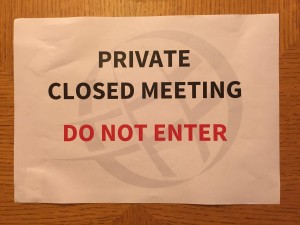ICANN has been taken to an Independent Review Proceeding by Manwin Licensing International.
Independent Review is a form of arbitration, which is provided for in ICANN’s By-laws.
What is ironic, is that this suit appears to be filed on behalf of a number of major players in Internet
pr0n
That is, the people behind such hit websites as ‘YouP*rn’ and ‘Br*zzers’ among others. (No, I’m not going to hyperlink them — Google is your friend if you really are curious ).
Internet porn has been major beneficiaries of the US First Amendment and the constitutional law doctrine that protects distasteful speech (such as ‘Net porn itself, or demonstrating about military presence in Afghanistan or similar at soldiers’ funerals!)
But it seems to be sauce for the gander tine when someone else wants to exercise their rights of free expression (that is to say, expression in the form new TLDs, and specifically in the form of .XXX) in a way which the pornsters don’t like.
In Europe the equivalent of the First Amendment is Article 10, which all Governments are under a legal obligation positively to protect.
It says: “Everyone has the right of freedom of expression. This right shall include freedom to hold opinions and to receive and impart information and ideas without inference by public authority and regardless of frontiers.”
Pretty clear.
It’s worth pointing out that free expression is not unlimited.
Restrictions can be placed on it, for example, balancing and protecting the rights of others. (Libel laws are an obvious example; there are many others).
The difference in approach can be see that, in the Land of the Free protesting at a soldiers funeral and causing distress to the bereaved is constitutionally guaranteed expression (Snyder v Phelps) where as in the UK you’d probably get locked up for Behaviour Likely To Cause a Breach of the Peace.
Burning the flag is perfectly acceptable behaviour in the USA, while burning poppies on Armistice Day attracts a criminal conviction, albeit attracting a fine. (Poppies are worn in remembrance of the dead on Armistice Day, our equivalent of Veterans Day).
However, the default position in Europe as in the USA, remains, that you have the right of expression, unless a qualifying factor is present and can be shown to be.
Article 10 goes on to say say: “The exercise of these freedoms, since it carries with it duties and responsibilities, may be subject to such formalities, conditions, restrictions or penalties as are prescribed by law and are necessary in a democratic society, in the interests of national security, territorial integrity or public safety, for the prevention of disorder or crime, for the protection of health or morals, for the protection of the reputation or rights of others, for preventing the disclosure of information received in confidence, or for maintaining the authority and impartiality of the judiciary”.
So surely this would mean that presumption must be that proponents of newTLDs can express themselves in the way the want to unless restrictions are necessary in a democratic society.
Censoring .XXX does not protect health or morals — there’s plenty enough internet porn under .COM, and I don’t think Manwin are arguing here for the content restrictions that this caveat might allow, anyway. They probably don’t want to open that door!
The only other aspect in 10(2) that they could pray in aid is the protection of the rights of others — in this case the very real property rights of Manwin and their allies. After all, intellectual and intangible property are equally property as any other kind.
And it’s a reasonable point, particularly as Luxembourg headquartered Manwin is, on the face of things, a European company, and Manwin therefore inherently has these Convention rights
But the starting point of Article 10 is that the expression must be allowed, and it’s only after considering the balancing exercise of considering the harm to Manwin’s Article 1 (Protocol 1) property rights, could the censorship they seem to be seeking be lawful.
And, this, I suggest, will be an uphill struggle.
Although Manwin’s property rights are in essence, and in law, exactly the same property rights that, for example, Google and Facebook have in their brands, Manwin’s task is made no easier by the unredeeming nature of their own content.
And the harm that they claim — well, why should they have special treatment above the thousands of WIPO cases over other, non-porn relating cybersquatting. A proper UDRP process and timely access to the Courts, is really all they can demand, and .XXX, and the forthcoming newTLDs will, at ICANN’s insistence, deliver this.
In conclusion, it seems to me that Manwin’s Independent Review Claim is just a case of a squeaky wheel not realising it is already sufficient lubricated, and demanding more oil.
